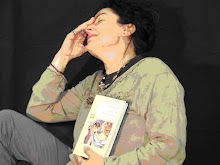El Cantar de Roldán (La Chanson de Roland, en francés) es un poema épico de varios cientos de versos, escrito a finales del siglo XI en francés antiguo, atribuido a un monje normando, Turoldo, cuyo nombre aparece en el último y enigmático verso: «Ci falt la geste que Turoldus declinet». Sin embargo, no queda claro el significado del verbo «declinar» en este verso: puede querer decir 'entonar', 'componer' o quizás 'transcribir', 'copiar'. Es el cantar de gesta más antiguo escrito en lengua romance en Europa. El texto del llamado Manuscrito de Oxford escrito en anglo-normando (de alrededor de 1170) consta de 4.002 versos decasílabos, distribuidos en 291 estrofas de desigual longitud llamadas tiradas -(en francés, laisses).  .
.
Ocho escenas de
La Chanson de Roland
en un manuscrito iluminado
Tanto el autor como la fecha de composición del poema se desconocen, aunque las discusiones académicas suelen proponer fechas que van desde el siglo VIII al XII d. C. La obra se conserva en el códice Nowel o Cotton Vitellius A. xv y dada la fama del poema, a pesar de que convive con otras obras en el mismo manuscrito, este se ha dado en llamar «manuscrito Beowulf». Aunque el poema no tiene título en el manuscrito, se le ha llamado Beowulf desde principios 
Beowulf , written in Old English sometime before the tenth century A.D., describes the adventures of a great Scandinavian warrior of the sixth century.
A rich fabric of fact and fancy, Beowulf is the oldest surviving epic in British literature.
Beowulf exists in only one manuscript. This copy survived both the wholesale destruction of religious artefacts during the dissolution of the monasteries by Henry VIII and a disastrous fire which destroyed the library of Sir Robert Bruce Cotton (1571-1631).
Gewat ða neosian, syþðan niht becom,
hean huses, hu hit Hringdene
æfter beorþege gebun hæfdon.
Fand þa ðær inne æþelinga gedriht
swefan æfter symble; sorge ne cuðon,
120
wonsceaft wera. Wiht unhælo,
grim ond grædig, gearo sona wæs,
reoc ond reþe, ond on ræste genam
þritig þegna, þanon eft gewat
huðe hremig to ham faran,
125
mid þære wælfylle wica neosan.
ða wæs on uhtan mid ærdæge
Grendles guðcræft gumum undyrne;
þa wæs æfter wiste wop up ahafen,
micel morgensweg. Mære þeoden,
130
æþeling ærgod, unbliðe sæt,
þolode ðryðswyð, þegnsorge dreah,
syðþan hie þæs laðan last sceawedon,
wergan gastes; wæs þæt gewin to strang,
lað ond longsum. Næs hit lengra fyrst,
135
ac ymb ane niht eft gefremede
morðbeala mare ond no mearn fore,
fæhðe ond fyrene; wæs to fæst on þam.
þa wæs eaðfynde þe him elles hwær
gerumlicor ræste sohte,
140
bed æfter burum, ða him gebeacnod wæs,
gesægd soðlice sweotolan tacne
healðegnes hete; heold hyne syðþan
fyr ond fæstor se þæm feonde ætwand.
Swa rixode ond wið rihte wan,
145
ana wið eallum, oðþæt idel stod
husa selest. Wæs seo hwil micel;
XII wintra tid torn geþolode
wine Scyldinga, weana gehwelcne,
sidra sorga. Forðam secgum wearð,
150
ylda bearnum, undyrne cuð,
gyddum geomore, þætte Grendel wan
hwile wið Hroþgar, heteniðas wæg,
fyrene ond fæhðe fela missera,
singale sæce, sibbe ne wolde
155
wið manna hwone mægenes Deniga,
feorhbealo feorran, fea þingian,
ne þær nænig witena wenan þorfte
beorhtre bote to banan folmum,
ac se æglæca ehtende wæs,
160
deorc deaþscua, duguþe ond geogoþe,
seomade ond syrede, sinnihte heold
mistige moras; men ne cunnon
hwyder helrunan hwyrftum scriþað.
Swa fela fyrena feond mancynnes,
165
atol angengea, oft gefremede,
heardra hynða. Heorot eardode,
sincfage sel sweartum nihtum;
no he þone gifstol gretan moste,
maþðum for metode, ne his myne wisse.
170
þæt wæs wræc micel wine Scyldinga,
modes brecða. Monig oft gesæt
rice to rune; ræd eahtedon
hwæt swiðferhðum selest wære
wið færgryrum to gefremmanne.
175
Hwilum hie geheton æt hærgtrafum
wigweorþunga, wordum bædon
þæt him gastbona geoce gefremede
wið þeodþreaum. Swylc wæs þeaw hyra,
hæþenra hyht; helle gemundon
180
in modsefan, metod hie ne cuþon,
dæda demend, ne wiston hie drihten god,
ne hie huru heofena helm herian ne cuþon,
wuldres waldend. Wa bið þæm ðe sceal
þurh sliðne nið sawle bescufan
185
in fyres fæþm, frofre ne wenan,
wihte gewendan; wel bið þæm þe mot
æfter deaðdæge drihten secean
ond to fæder fæþmum freoðo wilnian.
| Modern Text - Chapter II |
| WENT he forth to find at fall of night
|






No hay comentarios:
Publicar un comentario